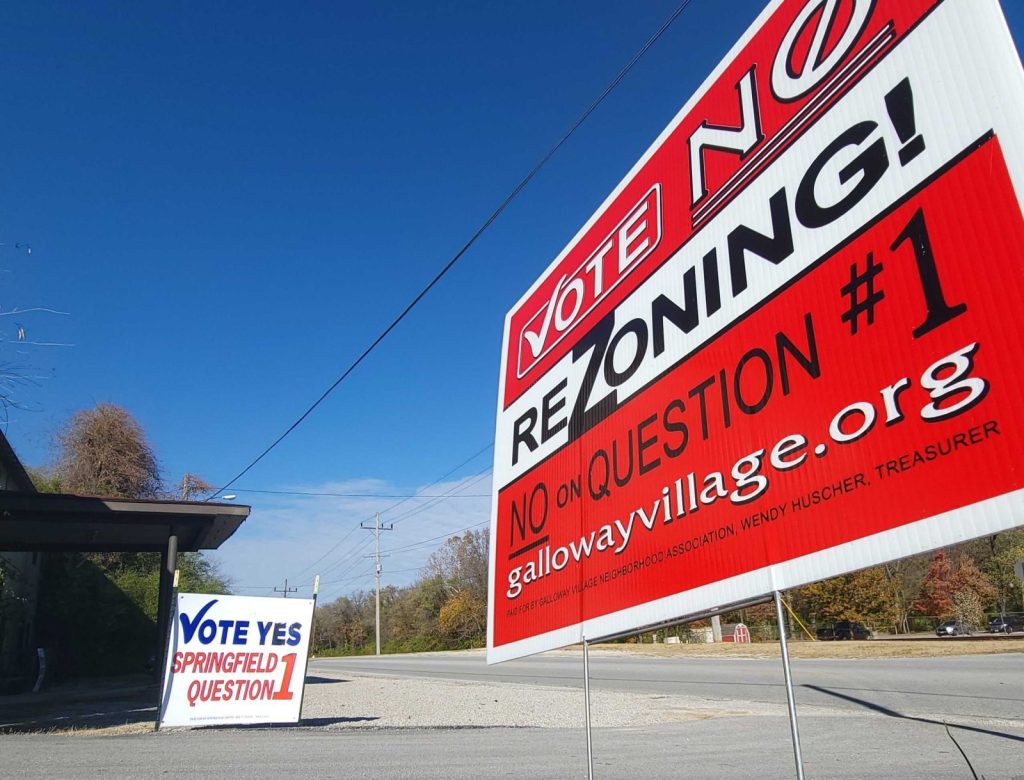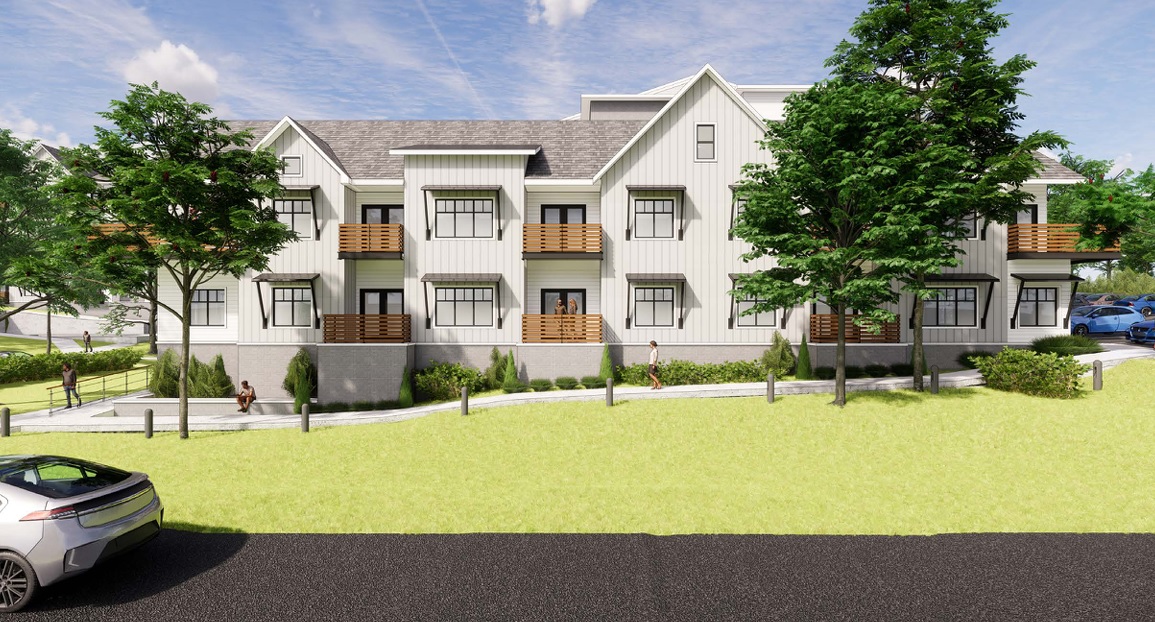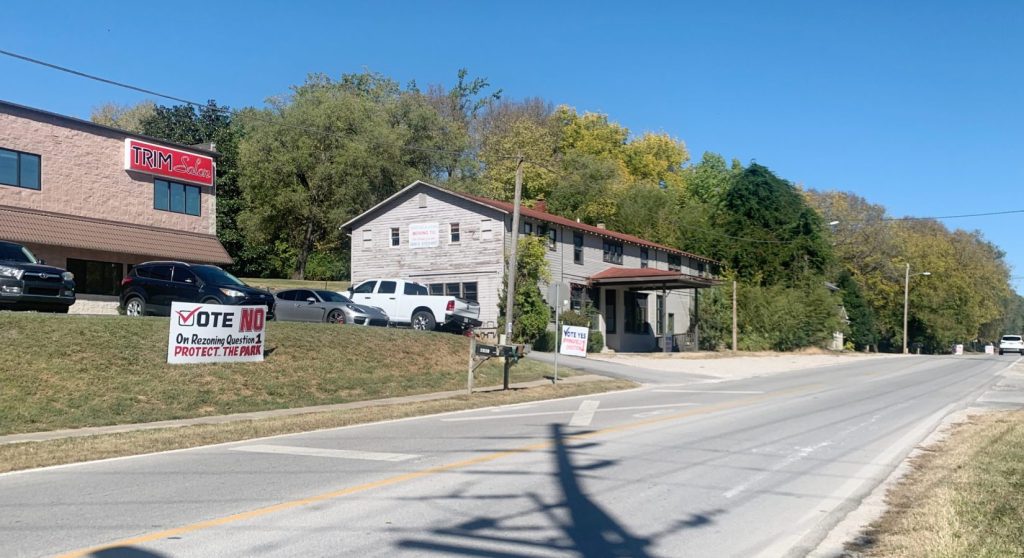Given the chance to decide the fate of 4.2 acres of land, the majority of voters from all 53,568 acres said “No” to a mixed use development with apartments and retail shops in Galloway Village.
| With 58 of 58 precincts reporting | Votes | Pct. | |
| Yes | 13,754 | 29.50 | |
| ✔ | No | 32,862 | 70.50 |
Just before midnight, Springfield Question 1 unofficially failed with “No” votes in the 70th percentile with 58 of 58 precincts reporting Nov. 8. This means Elevation Enterprises’ property on South Lone Pine Avenue will not be rezoned in order to make a mixed use development with more than 8,000 square feet of commercial building space possible. Question 1 opponents from the Galloway Village Neighborhood Association were thrilled on Tuesday night.

Galloway Village Neighborhood Association President Melanie Bach reacted over the sound of horns honking from passing cars along Lone Pine, as Question 1’s biggest opponents celebrated at a private watch party.
“I just think it sends a strong message that it never was just a few neighbors that didn’t want this; it was always Springfield citizens who enjoy Sequiota Park did not want this development,” Bach said.
The zoning dispute may or may not be resolved with the election results. Elevation Enterprises and/or the city of Springfield could challenge an appeals court ruling and request for the zoning matter to go before the Missouri Supreme Court.
“It’s up to the developer. The court case is technically still open,” Bach said. “We will make sure that we are there to defend our city’s charter, and the citizens’ right to vote on referendums, because we can’t count on our city to defend it. We would like — for everyone’s sake — for the matter to be resolved with finality.”
Basis for opposing the plan
Bach and the Galloway Village Neighborhood Association laid out several points of opposition, ranging from water runoff from the development flooding Galloway Creek to the removal of hundreds of trees to the overall quality of enjoyment of Sequiota Park.

The Galloway Village Neighborhood Association circulated a “Top 10 Reasons to Vote ‘No’” on the ballot measure. Among the reasons, the group lists concerns over the amount of tree removal needed for the development, the potential for stormwater runoff to cause flooding in Sequiota Park, added traffic that apartment buildings hold the potential to generate, changes to the landscape and aesthetic of the park and surrounding neighborhood and pedestrian safety.
Some of the people who live in Galloway Village say the development would infringe on their property rights because it favors “one developer’s request to rezone a property over all of the other property owners in the area that are adamantly opposed to this zoning change.”
Developer warned of slippery referendum slope
Elevation Enterprises developer Mitchell Jenkins thinks the outcome of the referendum election may lay out a playbook for opponents of future development proposals to stop rezoning and development through referendum petitions, creating a scenario where ordinance and procedures create barriers to development.
“There is nothing stopping anybody from gathering signatures and putting that same rezoning to a public vote,” Jenkins said. “That’s the scary thing here.”
Jenkins pointed out that the Springfield City Council and the Springfield Planning and Zoning Commission both voted to approve rezoning the property, which also had favorable recommendations from staffers in the Springfield Planning Department.
The developer provided an engineer’s stormwater assessment and runoff plan as part of the rezoning request. According to the plan, water from about 80 acres of land runs off onto the 4.2-acre development site. Elevation Enterprises planned to replace one box culvert that runs under Lone Pine Avenue to allow for fast drainage during a storm. The idea is to move water off the property and send it downstream faster, a claim the Galloway Village Neighborhood Association criticizes.
Apartments and endorsements

Elevation Enterprises’ project plan called for lower level retail and office spaces and about 100 apartments on the upper levels of two buildings.
Jenkins said he wanted to add more apartments to Springfield’s housing inventory because of the rising costs of residential rental property across the city.
“They’re skyrocketing,” Jenkins said. “There is a huge need for housing. I visited with a number of the not-for-profits in our community, and their biggest concern is our housing crisis and the shortage of housing that we have.”
Jenkins said he and his wife rented an apartment that went up in 2015.
“We lived in Galloway in one of those apartments and we absolutely loved it,” Jenkins said. “We like the mixed use because we want the broader community to be able to come and enjoy these restaurants and shops, but then the occupancy in those apartments in Galloway and the surrounding community are incredibly high, and that’s because people love the area.”
Springfield United, a political action committee that encouraged “Yes” votes for Question 1, campaigned with a series of endorsements from political, business and educational leaders from across Springfield. The list of persons who lent their name and words of support to Springfield United includes Missouri State University President Clif Smart, Ozarks Technical Community College Chancellor Hal Higdon, Springfield Chamber of Commerce director Matt Morrow, entrepreneurs Scott Bailes and Curt Marshall and Rebound Foundation founder Christina Ford. A disclosure at the end of a campaign video lists Bailes as the treasurer of Springfield United.
Jim Anderson, who was the president of the Springfield Chamber of Commerce from 1988 to 2014 also appears in Springfield United videos. Anderson is a member of the Hauxeda Board of Directors. Board members do not influence news coverage or editorial decisions.
Years of legal challenges

On Sept. 21, 2020, the Springfield City Council voted 7-1 to rezone the Elevation Enterprises property for a planned development. Galloway Village residents began collecting signatures to use a referendum petition procedure spelled out in the Springfield City Charter. The petitioners collected enough signatures to put the zoning case up for a public vote.
Elevation Enterprises filed a lawsuit to stop the zoning case from going to voters through the referendum petition process in 2020.
The first judge who saw the case ruled in favor of Elevation. On May 24, 2021, Greene County Circuit Judge David Jones made a ruling to stop plans for an election to decide the zoning case.
In his ruling, Jones found that the zoning referendum petition process in the Springfield City Charter conflicted with state law governing zoning procedures that does not grant citizens the right to decide zoning cases through a public election. The Galloway Village Neighborhood Association appealed the trial court judge’s decision, and the case went to the Missouri Court of Appeals.
Judge Mary W. Sheffield, Chief Judge Gary W. Lynch and Judge Jennifer R. Growcock made up the three-member panel that heard oral arguments in the case on March 22, 2022. The appellate court ruling in favor of the residents of Galloway Village came down June 8.
“Simply said, Elevation does not want its success in obtaining a change in zoning from the City Council to be subject to the vote of the people,” Growcock, the opinion author, wrote in the appeals court opinion. “Elevation purchased the property when it was not zoned for Elevation’s intended development. A change in zoning was required, subject to referendum from the beginning of the rezoning process, before development could begin.”
The ruling made the possible rezoning of Elevation Enterprises’ property subject to a public election before any development could occur. The zoning remained unchanged.
In a concurring opinion filed alongside Growcock's principal opinion June 8, Judge Lynch called the city of Springfield's legal argument against the Galloway Village neighbors, “a disingenuous and duplicitous attempt to seek from the courts an end run around the referendum requirements in its own charter.”

